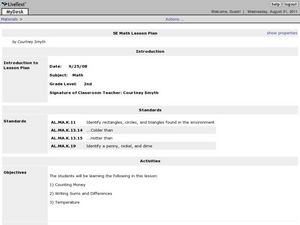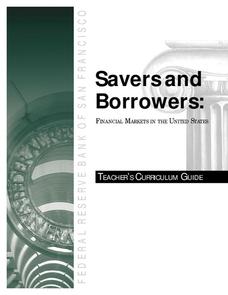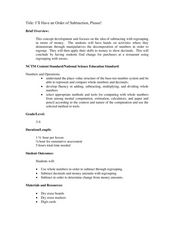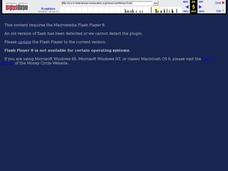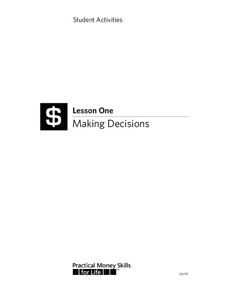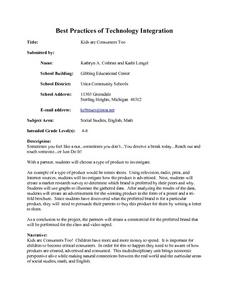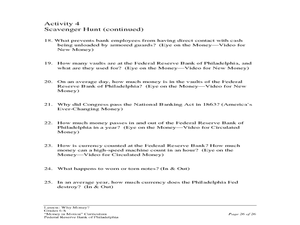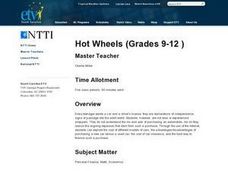Curated OER
Money Vocabulary
Explore the monetary system by completing worksheets in class. Learners will identify the monetary units of England and collaborate in groups to solve money word problems. They also identify several money-related vocabulary terms before...
Curated OER
Counting Money Activity
Second graders explore commerce by practicing monetary transactions. In this consumer math activity, 2nd graders practice using math functions to add and subtract different amounts of money. Students identify the different monetary units...
Curated OER
Buggin' Out (Identifying and Adding Amounts of Money)
Students explore consumer math by participating in estimate exercises. In this currency lesson, students identify and define each piece of U.S. currency and their value to the monetary system. Students complete several money worksheets...
Curated OER
Marriage and Financial Goals, Budgeting Strategies
There is no more useful life skill to learn than budgeting and setting financial goals. It's math that is used by every person, everyday. Learners examine the responsibilities and costs involved in family economics. Through a series of...
Curated OER
Savers & Borrowers: Financial Markets in the United States
Investigate the current financial market and have your class explore savings, borrowing, financial markets, mutual funds, and the stock market. This four-part lesson is designed to help young scholars become knowledgeable and informed...
Curated OER
I'll Have an Order of Subtraction Please!
Students explore number values by completing consumer math worksheets. In this math functions lesson, students identify the use of a decimal in numbers and the place values that are represented when dealing with money. Students complete...
Curated OER
Smart Consumers, Smart Choices
Students see what it means to be a smart consumer by engaging in a level-headed analysis of budget, opportunity costs and self-regulation. They compare prices within a service field, and weigh the choices of spending money on that item.
Curated OER
Teaching Economics Using LUNCH MONEY
Students, after reading the book "Lunch Money" by Andrew Clements, explore money and different saving places. They research different ways in which productivity has increased over the years, they examine products to determine if the...
Curated OER
The Money Circle
High schoolers investigate the Federal Reserve System. In this Mathematics/Economics lesson, students explore the role of the Federal Reserve in promoting a stable economic environment. In this multi-lesson unit of study,...
Visa
Making Decisions
What economic factors can influence personal and financial decisions? In an effort to understand opportunity costs and the time value of money, pupils engage in role-playing activities and discussion, as well as view a PowerPoint...
Curated OER
Kids Are Consumers Too
Students investigate a chosen product. They use television, radio, print, and internet sources to investigate how the product is advertised. Students create a market research survey to determine which brand is preferred by their peers...
Curated OER
Advanced Math Budget Project
What financial situations and decisions await young learners after they graduate from high school? This project allows class members to glimpse into the types of responsibilities they will have as adults, from considering job...
Curated OER
What Did It Cost 100 Years Ago?
Students compare prices of good across the century in order to introduce the topic of inflation. They undertand the concepts of inflation and Consumer Price Index (CPI), use online calculators to figure the approximate cost of goods...
Curated OER
Money & Work
Twelfth graders explain basic information concerning financial investments. They identify consumer rights and responsibilities and effective practices for purchasing consumer goods, services, housing and insurance. They list steps in...
Curated OER
Why Money?
Students participate in a trading simulation to learn about barter and the benefits of using money. In this barter lesson, students participate in a trading simulation and learn about coincidence of wants. Students then use money cards...
Curated OER
The Great Cookie Company
Fourth graders implement real life application of money, problem solving, economics, and consumer awareness. In this three week economics unit, 4th graders operate a business, write checks, balance accounts, and market their...
Curated OER
Potato Ways
Students analyze the packaging process. In this consumer awareness lesson, students analyze the process of packaging a potato and identify positive and negative ways of packaging. Students study statistics on an overhead transparency to...
Curated OER
Environmental Responsibility
Students discuss the importance of recycling and preventing pollution. In groups, they complete mini-studies on various environmental issues and evaluate different consumer products. They use global warming data to determine the...
Curated OER
History of Toys and Games
Young scholars research history of popular toys to learn when those toys were first introduced. They use measurement skills to create an accurate timeline.
Curated OER
Needs and Wants
Learners examine the difference between psychological needs and wants to control spending.
Curated OER
Hot Wheels (Grades 9-12 )
Using internet research, young scholars compute the costs of different models of card. They discuss the advantages/disadvantages of purchasing a new car versus a used car, the cost of car insurance, and the best way to finance their...
Curated OER
Payment Parliament
Students investigate how the economy works by role playing in their class. In this money management lesson, students read parts from a script for use in a role playing lesson simulating the Federal Reserve and their payment...
Visa
The Danger of Debt: Avoiding Financial Pitfalls
How can our perspectives of borrowing and returning influence the way we view credit? Pupils explore the concept of debt, how it impacts our ability to obtain credit, and finally the ways in which we can work to alleviate debt.
Curated OER
Your Role as a Taxpayer: Why Pay Taxes?
Pupils evaluate the basic rationale, nature, and consequences fo taxes. They describe why governments need taxes as revenue to provide goods and servicesin this series of activities.

